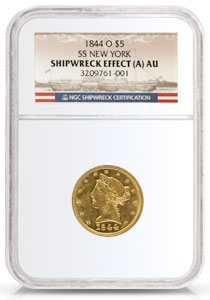The NGC Shipwreck Effect Designation for Authenticated Shipwreck Coins
When authentic shipwreck coinage retains its original surface character or shows no visual
evidence of immersion in water, it is graded using the
NGC Coin Grading Scale, a 70-point numerical scale.
Because of gold's inertness, in many cases, properly conserved gold coins show no effect of
prolonged submersion in saltwater, allowing them to grade without any specific mention of the
shipwreck effect. Although exceptionally high surface quality can be seen on some shipwreck
recovered silver coins, silver more frequently does retain signs of exposure to saltwater
regardless of the conservation methods used.
Because some recovered coins will show this shipwreck effect, NGC has adopted a grading
convention to certify and authenticate shipwreck coinage. This is the SHIPWRECK EFFECT
designation, and it allows NGC to accurately describe the condition of a coin by noting surface
disturbance that results from its preservation history.
Not all shipwreck artifacts are handled similarly. To earn this designation from NGC, several
conditions must be met. The coins must be recovered in an archaeologically sound manner, in
accordance with tested and proven procedures, to preserve the history of the wreck. Furthermore,
the coins must be conserved by the least invasive means possible to ensure stability of the
artifact surface and long-term preservation.
Grading Standards for Shipwreck Effect Designated Coins
SHIPWRECK EFFECT A — a coin exhibiting minimal surface disturbance from
saltwater exposure, and exhibiting superior eye appeal for a shipwreck artifact.
SHIPWRECK EFFECT B — a coin showing evidence of light surface disturbance
from immersion in saltwater, and may have some areas of moderate disturbance, not affecting
central design elements. Coin possesses above-average eye appeal for shipwreck recovery coin.
SHIPWRECK EFFECT C — a coin displaying moderate disturbance to its surface
from exposure to saltwater, while possessing at least average eye appeal for a recovery specimen.
Accurate attribution and identification is not hindered by any surface impairment.
SHIPWRECK EFFECT D — a coin with moderate surface deterioration from saltwater
exposure and with small areas of heavier disturbance, including corrosion confined to one side of the
coin and/or its peripheries. Coin possesses at least average eye appeal for a shipwreck recovery artifact.
SHIPWRECK EFFECT E — a coin with heavy surface deterioration, but still possessing
ample areas of moderate disturbance. Disturbance does not hinder assessment of its original condition and
accurate attribution.
SHIPWRECK EFFECT — portions of the coin exhibit heavy to severe disturbance
from saltwater exposure, with metal loss affecting the design. While accurate identification and
attribution may be possible, it is no longer possible to draw conclusive determinations about the
coin’s surface prior to saltwater exposure.
NGC Genuine Designation for Authenticated Shipwreck Coins
NGC Shipwreck Certification uses the term GENUINE to describe authentic shipwreck coins and
artifacts with confirmed and documented origins. Recovered artifacts may be identified by
attestation from the individuals who discovered the wreck, an independent archeological survey or
other means. The assigned pedigree and authenticity of the wreck are subsequently confirmed
independently by NGC experts. While often available, additional archaeological evidence is not
necessary to support this designation.
Wear Grades of Shipwreck Effect Designated Coins

In addition to categorizing the level of surface disturbance, NGC assigns a wear or details grade to
coins designated SHIPWRECK EFFECT C or better. This convention attempts to describe the state of wear
of the coin prior to shipwreck and saltwater exposure.
UNC (Uncirculated) — a coin showing no wear or evidence of having circulated.
AU (About Uncirculated) — traces of light wear are evident on the high
points of the coin’s design.
XF (Extremely Fine) — design features are well defined although light wear
is evident throughout.
VF (Very Fine) — major details of the coin are clear although light wear is
evident; the high points show moderate wear.
F (Fine) — moderate wear or many elements with heavy wear on high points. The
major design elements remain visible.
VG (Very Good) — heavy wear flattens design elements, although major features
are clearly outlined.
G (Good) — design details are flat and visible in outline. Some portions of
the design may be faint.